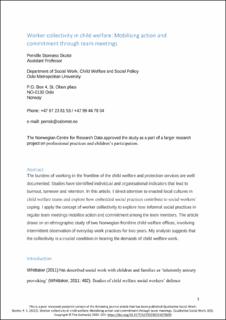Worker collectivity in child welfare: Mobilising action and commitment through team meetings
Peer reviewed, Journal article
Accepted version
Permanent lenke
https://hdl.handle.net/11250/3051258Utgivelsesdato
2022-04-09Metadata
Vis full innførselSamlinger
- Publikasjoner fra Cristin [3269]
- SAM - Institutt for sosialfag [471]
Sammendrag
The burdens of working in the frontline of the child welfare and protection services are well documented. Studies have identified individual and organisational indicators that lead to burnout, turnover and retention. In this article, I direct attention to enacted local cultures in child welfare teams and explore how embedded social practices contribute to social workers’ coping. I apply the concept of worker collectivity to explore how informal social practices in regular team meetings mobilise action and commitment among the team members. The article draws on an ethnographic study of two Norwegian frontline child welfare offices, involving intermittent observation of everyday work practices for two years. My analysis suggests that the collectivity is a crucial condition in bearing the demands of child welfare work.
